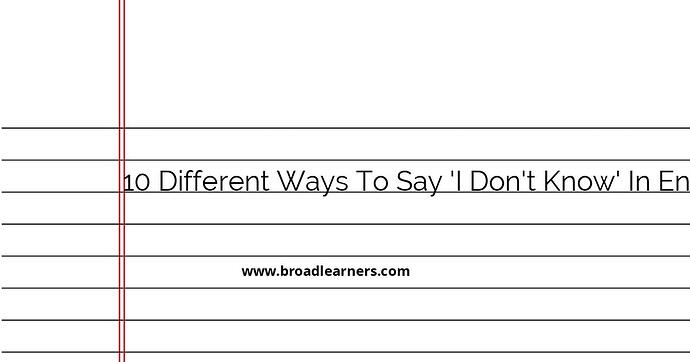When you're unsure about something and need to express that in English, it's common to say 'I don't know.' However, using the same phrase repeatedly can get monotonous. Here are ten different ways to say 'I don't know' in English:
- I'm not sure
- I have no idea
- I'm clueless
- I haven't got a clue
- I'm not certain
- I'm uncertain
- Beats me
- It evades me
- I'm at a loss
- I'm drawing a blank
Each of these alternatives can be used depending on the context and level of formality needed in the conversation.
1. I'm Not Sure
'I'm not sure' is a polite and common way to convey uncertainty. It's appropriate in both formal and informal settings.
Example: When asked about the weather forecast for tomorrow, you can respond, 'I'm not sure, I haven't checked.'
2. I Have No Idea
This phrase expresses a lack of knowledge in a straightforward manner. It's more casual and can be used among friends or colleagues.
Example: If someone asks you about the outcome of a sports game that you didn't watch, you can say, 'I have no idea.'
3. I'm Clueless
'I'm clueless' is a slightly humorous way of admitting you don't know something. It's best used informally among people you are comfortable with.
Example: When asked about a complicated recipe, you can jokingly say, 'I'm clueless in the kitchen!'
4. I Haven't Got a Clue
This phrase has a similar meaning to 'I have no idea' but adds a bit of emphasis. It is more informal and can show a higher level of uncertainty.
Example: If questioned about a difficult riddle, you might respond, 'I haven't got a clue!'
5. I'm Not Certain
'I'm not certain' is a polite way of indicating doubt or lack of confidence in the information. It is suitable for formal or professional situations.
Example: During a business meeting, you could say, 'I'm not certain about the exact figures, but I can check and get back to you.'
6. I'm Uncertain
This phrase conveys a similar meaning to 'I'm not certain' but with a more personal touch. It can be used in various contexts.
Example: When discussing travel plans with a friend, you might say, 'I'm uncertain about the dates; let me confirm and get back to you.'
7. Beats Me
'Beats me' is an informal and slightly casual way of saying you don't know something. It can imply a sense of confusion or bewilderment.
Example: If someone asks you why the internet connection is slow, you can shrug and say, 'Beats me!'
8. It Evades Me
'It evades me' suggests that the information is somehow escaping your understanding. It's a more sophisticated way to express uncertainty.
Example: When unable to recall a historical fact, you could say, 'I'm sorry, but that detail evades me at the moment.'
9. I'm At a Loss
'I'm at a loss' indicates a deeper sense of not knowing or understanding something. It can convey a sense of helplessness or confusion.
Example: If a colleague asks for your opinion on a complex issue, you might say, 'I'm really at a loss on this one.'
10. I'm Drawing a Blank
To 'draw a blank' means to be unable to remember or think of something. It's a casual expression suitable for various situations.
Example: When trying to recall an acquaintance's name but failing, you can admit, 'I'm drawing a blank right now.'
Did I miss anything? Respond below
